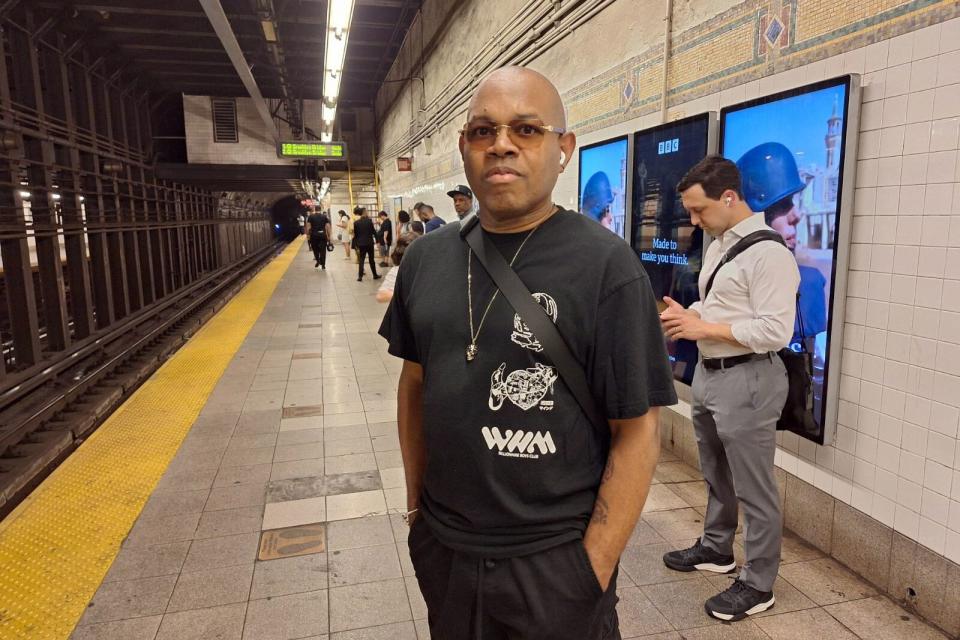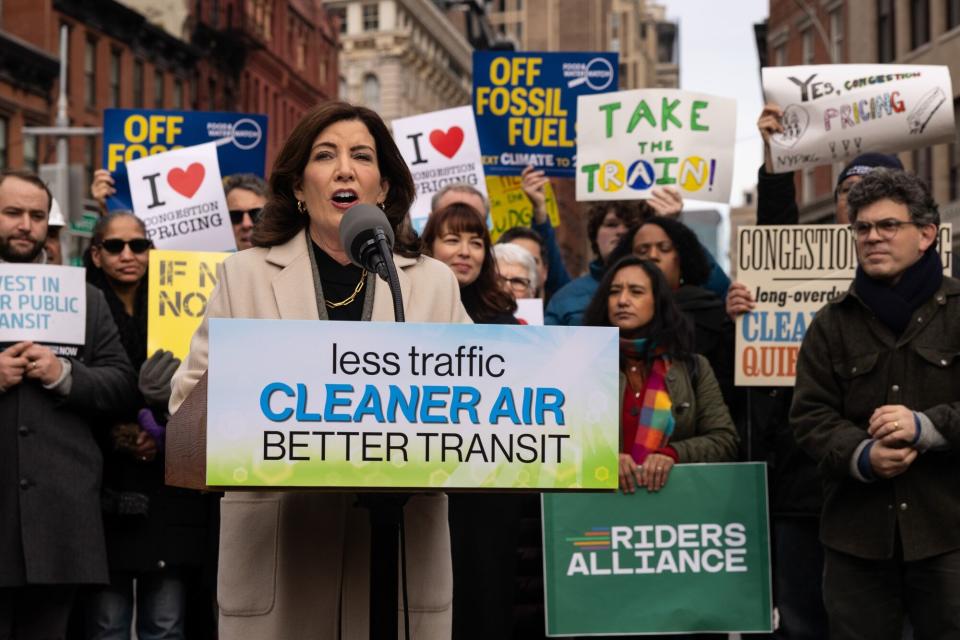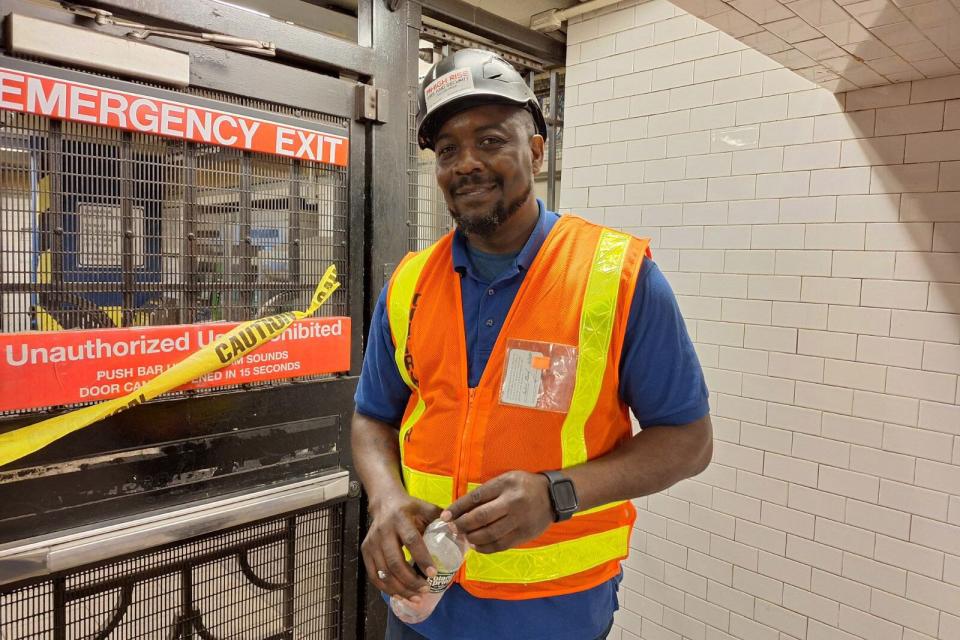New Yorkers Who Dreaded $15 Fee Cheer Kathy Hochul’s Shock Decision
(Bloomberg) -- Brooklynites and Manhattanites. Democrats and Republicans. Drivers and subway riders. Especially Staten Islanders. New Yorkers of all stripes are cheering over the halt of a $15 fee.
Most Read from Bloomberg
Real Estate Investors Are Wiped Out in Bets Fueled by Wall Street Loans
Billionaire-Friendly Modi Humbled by Indians Who Make $4 a Day
A Struggling Business Park Deals a Blow to Singapore's Regional Hub Ambitions
They’re celebrating Governor Kathy Hochul’s stunning decision to suspend a plan to charge people driving into Manhattan beginning June 30. The toll was aimed at reducing traffic, improving air quality and raising $1 billion a year to repair public transportation.
It was a measure 17 years in the making, and would have been the first of its type in the US. But with inflation supercharging the cost of living in New York over the past couple of years, the prospect of having to pay the fee irked too many of the city’s residents.
“I’m thrilled it’s stalled,” said Susan Switzer, a business consultant who lives in Midtown. “We can’t afford to take our car out a few days a week.” She drives to Queens a few times a week and said the toll shouldn’t have applied for Manhattan residents, because she believes they already pay high taxes and parking fees.
The decision stunned New Yorkers, including transit advocates and some politicians, such as Manhattan Borough President Mark Levine, who slammed the move for blocking funds to fix the subways.
The timing of Hochul’s suspension raised speculation about why. She said Wednesday her decision was driven by the goal of shielding the working class from inflation. But price increases in everything from groceries to housing and insurance have been squeezing New Yorkers — and Americans across the nation — for well over a year.
Hochul was concerned that implementation of the unpopular plan risked affecting Democrats’ chances in upcoming House races across the state this November, according to a person with knowledge of her thinking. The contests are expected to be competitive, with power over Congress hanging in the balance.
Hochul also faced pointed criticism in 2022 for New York Democrats’ losses in swing districts, which effectively handed control of the House to the GOP.
But the pricing plan had also raised concerns among outer borough Democrats, who feared the impact on less-wealthy residents who live in New York’s farthest reaches, often long distances from mass transit. Some of those officials supported Hochul’s decision to delay.
“I want to express my appreciation to Governor Kathy Hochul for listening to the concerns of New Yorkers and pausing the launch of congestion pricing,” said Queens City Council Member Nantasha Williams, a Democrat whose district in southeastern Queens has fewer mass transit options than other parts of the city.
The fee was predicted to generate resources to help revamp a more than 100-year old transit system that has been ravaged by heavy rain and severe flooding. Subway-signal upgrades to curb train delays, new electric buses and the extension of the Second Avenue subway to Harlem were all meant to be funded with the money.
But Withlin Ward, a stylist who lives in Brooklyn, is skeptical of these goals. “They always say that and nothing happens,” he said, noting that subway fares were raised only recently.
Xavier Walker, who fixes fire alarms for MTA contractor High Rise Fire and Security, said the $15 toll was too high, and would only have gone up, hurting people’s already stretched budgets. “It would be good to help make MTA accessibility easier,” he said. “These guys have already generated money” by raising subway fares, he said.
Queens Borough President Donovan Richards, also a Democrat, said he has long supported congestion pricing but had previously spoken with Hochul and testified before the Metropolitan Transportation Authority about his concerns over the program’s details — specifically the amount of the toll, which posed a potential hardship to middle class Queens residents who live far from mass transit and who drive to and through Manhattan for work.
“I have spoken to the governor about the price scheme,” Richards said. “We relayed $15 certainly being a very steep price.”
Richards also faulted the MTA’s messaging, particularly to outer borough residents who would feel the impact of congestion pricing most acutely.
The MTA “never told the public what they’re gonna get out of it,” Richards said, pointing out that officials couldn’t pinpoint mass transit improvements the program would fund that specifically benefited eastern and southeastern Queens residents.
“There really wasn’t a strategic vision laid out for residents in the outer reaches of the city on what does this mean, how does this benefit them?” Richards said.
Still, not everyone was supportive of Hochul’s decision. Some lawmakers and good government groups criticized the governor, questioning how the state would now fund the MTA’s capital needs.
“The Governor’s reckless decision to effectively kill congestion pricing in New York City — and every other city in America that is considering following New York’s example — is a staggering error,” said State Senator Liz Krueger, a Democrat who represents parts of Midtown and Manhattan’s Upper East Side.
“On top of the financial crisis she is creating, this is simply a terrible policy decision, full stop,” Krueger said.
Democratic Queens State Senator Jessica Ramos called the delay “a slap in the face to our neighbors who rely on a functioning public transportation system.”
In Albany, a group of lawmakers questioned Hochul’s reasoning.
Transportation activists like Elizabeth Adams, executive director for public affairs at Transportation Alternatives, were particularly incensed.
“The next time your train is late, your bus is trapped in traffic, your subway station is still missing an elevator, you know who to blame: Governor Kathy Hochul,” Adams said.
Nonetheless, Hochul drew support from a broad range of political interests, whose concerns rarely align: the United Federation of Teachers President Michael Mulgrew, who had joined a lawsuit in an effort to stop the program’s implementation, the New York Taxi Workers’ Alliance President Bhairavi Desai, and Harry Nespoli, chair of the Municipal Labor Committee, which represents hundreds of thousands of municipal employees.
“We need to address congestion in the central business district, but another surcharge on struggling yellow taxi drivers was never the right solution,” Desai said.
Republican Congress member Nicole Malliotakis, whose district covers Staten Island and some parts of Brooklyn, was also pleased.
--With assistance from Zach Williams and Michelle Kaske.
(Updates with comment on potential impact on subway finances in fifth paragraph.)
Most Read from Bloomberg Businessweek
Sam Altman Was Bending the World to His Will Long Before OpenAI
David Sacks Tried the 2024 Alternatives. Now He’s All-In on Trump
Startup Brings New Hope to the Pursuit of Reviving Frozen Bodies
©2024 Bloomberg L.P.

 Yahoo News
Yahoo News 




